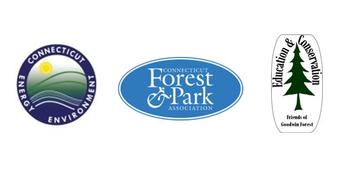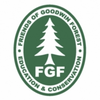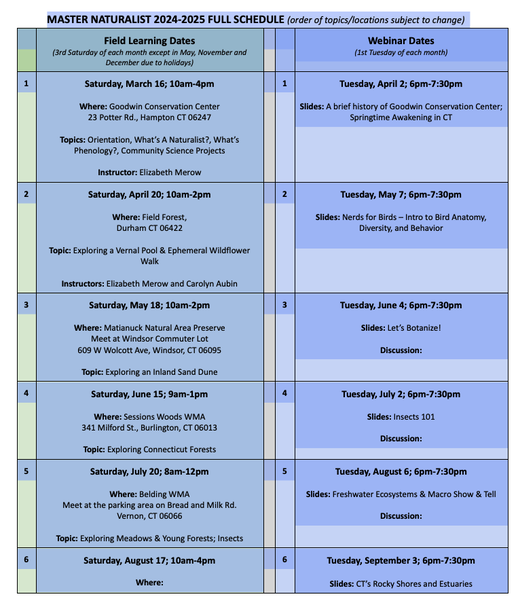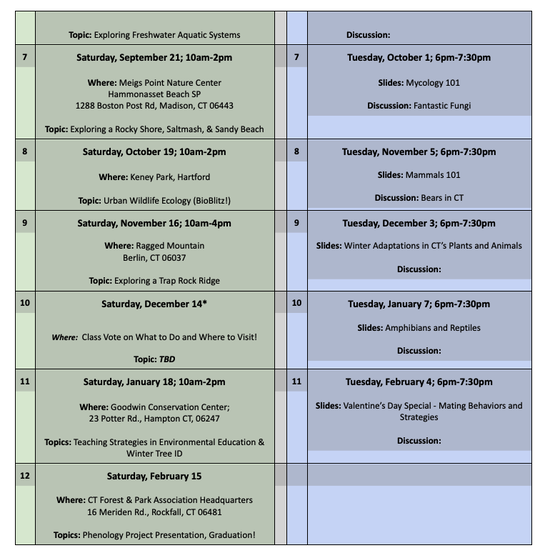The Goodwin Master Naturalist Program
Applications are now closed for 2024
James L. Goodwin Conservation Center Master Naturalist program
The mission of James L. Goodwin Conservation Center’s Master Naturalist program is to develop a diverse community of naturalists and promote stewardship of the environment. Are you interested in learning more about the habitats, plants, animals and natural history of Connecticut? Are you a landowner, citizen, teacher, park naturalist, land trust employee, conservation planning board member or natural resource professional looking to increase your knowledge of the natural environment? If so, join us for our 2022 Master Naturalist Training.
Through this program, participants will learn about the ecosystems of Connecticut, the animals and plants that inhabit our area, and current conservation issues affecting our wildlife and natural resources. The program includes a mix of indoor classroom presentations and outdoor hands-on field sessions where participants learn to identify, interpret, and understand key ecological Connecticut’s natural resources through education and service. Participants completing the Level I course will become “Apprentice Naturalists”, and no further training is required. Individuals interested in becoming a “Master Naturalist” may go on to complete the Level II course.
The mission of James L. Goodwin Conservation Center’s Master Naturalist program is to develop a diverse community of naturalists and promote stewardship of the environment. Are you interested in learning more about the habitats, plants, animals and natural history of Connecticut? Are you a landowner, citizen, teacher, park naturalist, land trust employee, conservation planning board member or natural resource professional looking to increase your knowledge of the natural environment? If so, join us for our 2022 Master Naturalist Training.
Through this program, participants will learn about the ecosystems of Connecticut, the animals and plants that inhabit our area, and current conservation issues affecting our wildlife and natural resources. The program includes a mix of indoor classroom presentations and outdoor hands-on field sessions where participants learn to identify, interpret, and understand key ecological Connecticut’s natural resources through education and service. Participants completing the Level I course will become “Apprentice Naturalists”, and no further training is required. Individuals interested in becoming a “Master Naturalist” may go on to complete the Level II course.
COURSE MATERIALS
- Participants will receive their own copy of Naturally Curious: A Photographic Field Guide and Month-By-Month Journey Through the Fields, Woods, and Marshes of New England by Mary Holland to add to their library.
- A copy of the book Connecticut Wildlife: Biodiversity, Natural History, and Conservation by Geoffrey A. Hammerson will be loaned out to each student the first day of the program and returned on the last day.
- Participants will also receive a small field notebook and loupe.
- Participants will have access to a Master Naturalist Google Drive folder, which will contain program documents, presentation slides, recommended readings, photos from our classes, etc.
WHAT WILL BE LEARNED?
- An overview of the James L. Goodwin Master Naturalist Program, including the mission and objectives of the program, and the guidelines for participation
- What a naturalist is and does and the significance of naturalists and natural history
- Connecticut’s unique habitats and the flora and fauna that live in each
- The importance of phenological observations
- Basic concepts of ecology and geology
- The art and science of nature interpretation and environmental education
- How to get involved in community science projects around Connecticut
Questions? Contact Master Naturalist Administrator, Elizabeth Merow, at 860.398.4527 or [email protected].

This program is possible by our supporting partners:
CT Department of Energy and the Environment, Connecticut Forest and Parks Association, and the Friends of Goodwin Forest.
CT Department of Energy and the Environment, Connecticut Forest and Parks Association, and the Friends of Goodwin Forest.
Quotes from previous Master Naturalist Students:
"This course has opened my eyes to so much more and has left me wanting to learn more. The enthusiasm and passion for what is being taught is incredible."
"Loved the program and can't say enough to others about the experiences. 'Awesome' usually starts the conversation."
All classes "were extraordinarily well done and the expertise which was apparent for every class would be difficult to match anywhere."
"I liked the fact that the course was somewhat challenging while not being demanding. It gave plenty of additional info/opportunity for those well versed in a particular area to follow up without overwhelming those who were less familiar with that area."
"Based on my experience with the course, it gave me improved knowledge of CT ecosystems. I have added sufficient knowledge to my repertoire which gives me a greater comfort level for outreach work. The course sparked sufficient interest in me such that I spent the spring and summer reinforcing what I learned."
"This course has opened my eyes to so much more and has left me wanting to learn more. The enthusiasm and passion for what is being taught is incredible."
"Loved the program and can't say enough to others about the experiences. 'Awesome' usually starts the conversation."
All classes "were extraordinarily well done and the expertise which was apparent for every class would be difficult to match anywhere."
"I liked the fact that the course was somewhat challenging while not being demanding. It gave plenty of additional info/opportunity for those well versed in a particular area to follow up without overwhelming those who were less familiar with that area."
"Based on my experience with the course, it gave me improved knowledge of CT ecosystems. I have added sufficient knowledge to my repertoire which gives me a greater comfort level for outreach work. The course sparked sufficient interest in me such that I spent the spring and summer reinforcing what I learned."


